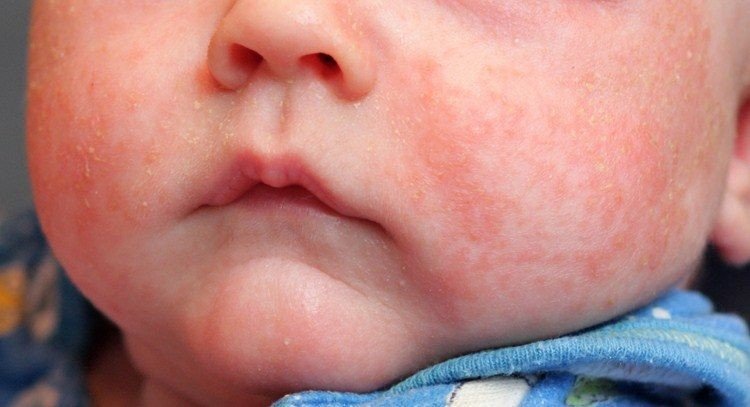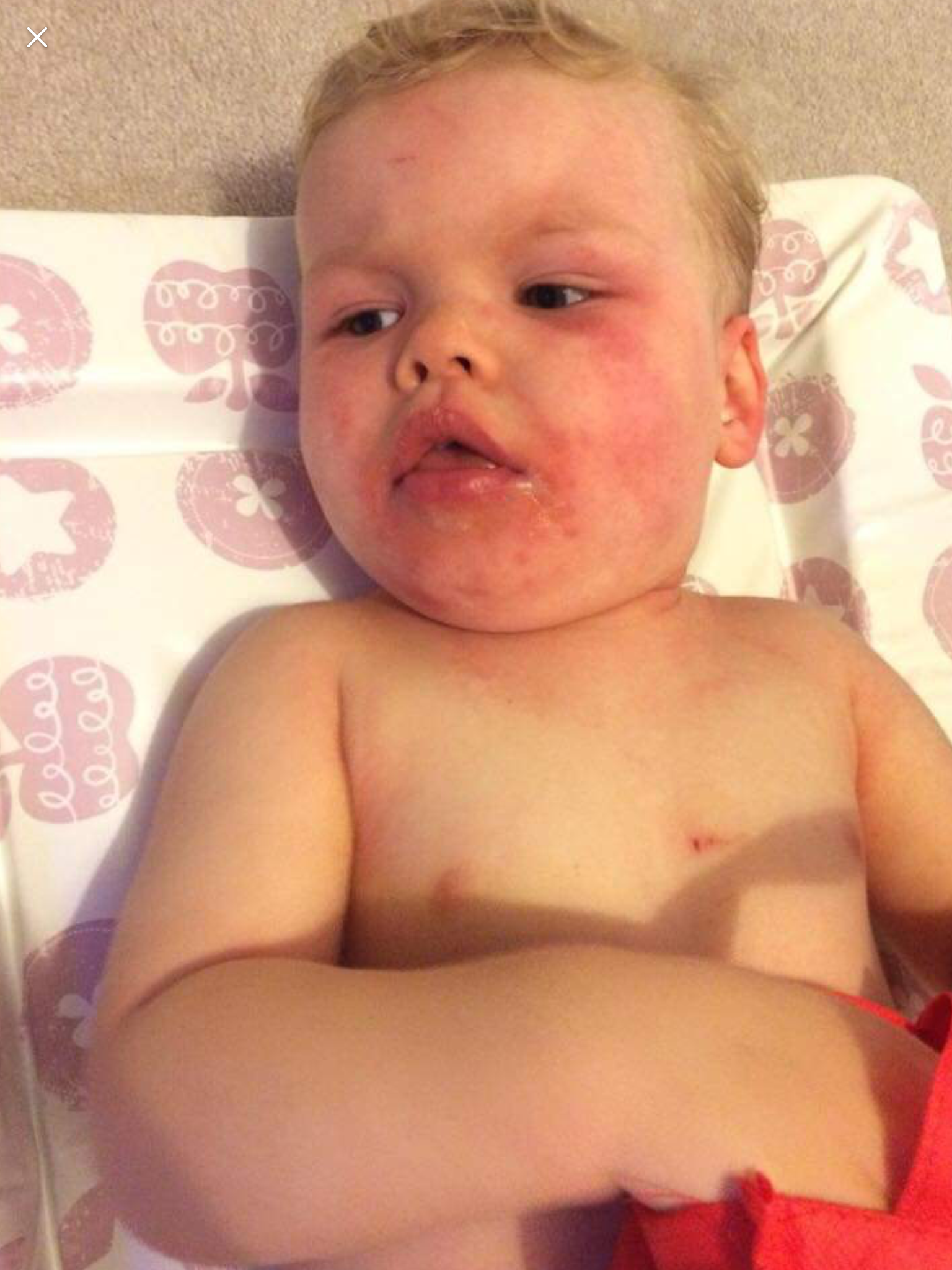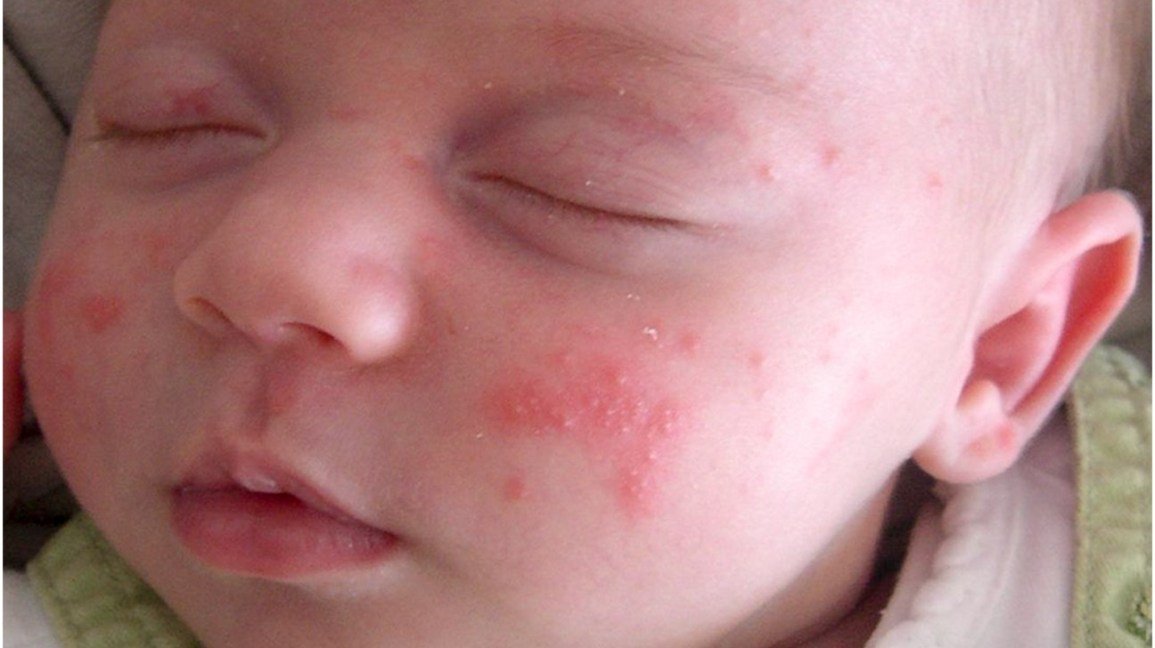Does Eczema Really Go Away Did Your Baby Outgrow Eczema
If you Google about children outgrowing eczema, many authority websites will indeed state that children outgrow atopic dermatitis . Some say that by age of 4-5 years old children outgrow eczema. Others say by the age of 3. There may be occasional flareups and then it may resume again during puberty due to hormones and stress.
About half of those with eczema develop symptoms before they are 1 year old. Almost all children develop symptoms by age of 5 years old. About ¾ of children with eczema will have symptoms resolve before puberty. The rest will go on to have eczema as adults or eczema may come back suddenly.
Another paper states that atopic dermatitis persists in children who develop it during ages 2 to 5 years old. It can resolve by age 10 in 80% of children with eczema and by age 20 in up to 95% of afflicted people.
In other words, there is a very good chance your child will outgrow their eczema or eczema will go away with time.
Does Eczema Get Better With Age
Its not uncommon for people to have eczema their whole life. In most cases as you age eczema symptoms get better they just never truly go away completely.Eczema can go into a remission stage, and this can be something that lasts for years without those daily eczema woes.
Studies have shown that between the ages of 3-6 that any type of eczema can dramatically improve. If the child has a good daily regimen for treating their eczema this will usually be the case. The child could start to see flare-ups more often as they start to go through puberty in their teenage years. Teenage years are filled with a frenzy of hormones which really restarts those eczema symptoms.
It has been said that 2 out of every 3 childrens eczema will get better with age and that they will outgrow it altogether. I can absolutely vouch for this personally. My eczema has gotten extremely better ever since I was a child. There have only been 2 reasons why my eczema gets bad in adulthood:
Not sticking to my daily moisturizing treatment Eating very poorly
When I eat healthy and stay with my daily treatments my skin is always at its best. I have never been able to get rid of eczema forever, but I have been able to control it consistently as an adult. Any type of eczema can surely get better as you age you just need to handle eczema with absolute consistency every single day.
Inspect Your Childs Environment For Triggers
Common environmental triggers include dust, rough fabrics, and even high temperatures that can irritate your childs skin, leading to a flare-up. To prevent these itchy, red breakouts, inspect your childs environment and remove or prevent contact with:
- Tight or rough clothing
For further flare-up protection, pat your childs skin dry with a soft towel and then apply an emollient cream immediately after bath time.
Recommended Reading: What Causes Dyshidrotic Eczema On Hands
Will My Child Grow Out Of Eczema
There are many illnesses and conditions that affect infants and children. One example is the skin condition eczema.
Studies show that eczema is one of the most common childhood skin conditions and presents differently depending on when your child gets it. This condition isnt curable and tends to flare up at different times, but does that mean your child must deal with it the rest of their life?
At their three New York City locations, Dr. Javier Zelaya and the skilled medical team at Skinworks Dermatology have over 25 years of experience treating children with a variety of skin conditions, including eczema.
What Are Eczema Symptoms And Signs

Eczema, or atopic dermatitis, is a common rash that occurs in people of all ages.
- It is particularly common in children.
- Eczema can start early, during the first few months of life.
- The eczema rash is red, dry, and itchy.
- Some children grow out of it, whereas others can have sensitive skin and a rash for years.
- Eczema tends to come and go and may get worse during certain times of the year, such as during the colder, drier winter months.
Symptoms
- Eczema is a skin condition that usually appears as an itchy, red patch on the hands feet backs of elbows, and around the knees, ankles, and wrists.
- It may also affect your baby’s cheeks, chin, chest, forehead, or scalp.
- Eczema can appear in other areas, too .
- Dry skin, sweating, pet dander, or even dust can cause a flare-up of your child’s eczema.
- Scratching also can make eczema worse, causing redness, swelling, and other symptoms such as itching.
Unfortunately, there is no cure for eczema. It tends to come and go. Kids often outgrow some of their eczemas, but they may continue to have rashes or sensitive skin for life.
You May Like: How To Treat Nummular Eczema
Causes Of Eczema In Babies
Although the cause of eczema isn’t completely understood, up to 10% of babies and toddlers have it. If you have a family history of eczema, asthma, or hay fever, your baby may be more likely to develop it. Eczema in adults may not look the same in a child, which is why identifying symptoms and triggers is important to protect your baby’s skin. Triggers of eczema in babies may include the following:
Irritants
- Many soaps, disinfectants, and fragrances can make eczema worse for your baby’s skin.
- Common products that may cause flare-ups include detergents and dryer sheets, bubble baths and some shampoos, disinfectants such as chlorine, dyes, and coarse fabrics such as wool and other rough materials.
Allergens
- Typical allergens such as dust mites, pet dander, pollen, and mold can cause itchy, inflamed skin. Eczema is not an allergic reaction to a substance, but allergens or irritants in the environment can trigger it.
- Make your home an allergy-free zone by vacuuming and wet dusting frequently and keeping soft toys to a minimum and washing them often. Groom pets regularly.
Environment
- Extremes in temperature and humidity may trigger an eczema flare-up.
- Environmental triggers include very hot or very cold temperatures, high or low humidity, cigarette smoke, and pollution.
- Keep your baby’s bedroom temperature between 68 F and 72 F and maintain even humidity in your home.
- Use a humidifier if the air in your home is dry.
Food
Abnormal or sensitive skin
Animals
Herpes virus infection
Will My Child Ever Outgrow Eczema
A common question amongst parents is: will my child ever outgrow eczema? The normality is that the severity of eczema can be outgrown and usually is. In most cases, dry skin will remain with the individual into adulthood. Other health-related issues tied to eczema such as asthma could also be something that follows into adulthood.
I personally feel like Ive outgrown eczema, but I still have tons of eczema like symptoms I deal with. As a child, my eczema was extremely bad and most of the time not tolerable. I noticed as my teenage years came that my eczema got better. I think based on research and my own experiences many eczema sufferers will outgrow the extreme side of things but may never be able to get rid of it completely. The key is to keep a consistent treatment routine, and it all starts when you are a child.
Recommended Reading: How To Get Rid Of Dyshidrotic Eczema On Hands
What Percentage Of Babies Have Eczema
Its common that one out of every five babies under the age of two years old have some sort of eczema. The percentage of babies that are actually born with eczema is higher in colder climates, polluted climates, or if there is a family history of dry skin.
A babys eczema also differs by demographic. According to the National Eczema organization, African American babies suffer at a higher percentage than any other race in the United States. African American babies make up about 20.2% then Asians at 13%, Native Americans at 13%, Whites 12.1%, and lastly Hispanics at 10.7%. Atopic Dermatitis is at the top when it comes to babies who have eczema. One of the other types of eczema will usually occur as you get older and location can play a huge role in how bad it can become.
Can I Do Anything To Prevent My Baby’s Eczema Flare
- Keep your baby’s fingernails trimmed, to reduce any damage to the skin from scratching . You could also consider buying some anti-scratch mittens to help protect the skin .
- If your baby gets a flare-up when wearing certain fabrics, opt for natural materials such as cotton instead. Avoid wool though, as this can also be a trigger .
- Replace soaps and bubble baths with an unscented liquid cleanser, which is kinder to your baby’s skin .
- Use a mild laundry detergent that contains no perfumes or dyes. Avoid bleach or fabric softener . You can also use a double rinse cycle to make sure that any detergent residue is gone from your baby’s clothes and bedding before using them .
- Keep your home cool, especially your baby’s bedroom, as getting too hot and sweaty can cause a flare-up .
- If you enjoy swimming with your little one, rinse your babys skin well with fresh water afterwards to remove the chlorine, and moisturize the skin thoroughly after that .
- If being around your pets seems to make your baby’s eczema worse, keep them out of your little ones bedroom and vacuum the rest of the house regularly. It’s also a good idea to wash and groom your pets and their bedding frequently . If your child’s eczema is particularly severe, you may even want to consider re-homing your animal . As tough as this can be, it may be the best option for your baby.
Read Also: Which Is Worse Psoriasis Or Eczema
Symptoms Of Atopic Eczema
Atopic eczema causes the skin to become itchy, dry, cracked and sore.
Some people only have small patches of dry skin, but others may experience widespread inflamed skin all over the body.
Inflamed skin can become red on lighter skin, and darker brown, purple or grey on darker skin. This can also be more difficult to see on darker skin.
Although atopic eczema can affect any part of the body, it most often affects the hands, insides of the elbows, backs of the knees and the face and scalp in children.
People with atopic eczema usually have periods when symptoms are less noticeable, as well as periods when symptoms become more severe .
Did My Baby Develop Eczema Because I Couldnt Breastfeed
As eczema is caused by genetic factors, bottle-feeding a baby definitely cannot cause eczema. In fact, current research is divided, with some studies showing positive effects of breastfeeding and others showing no significant effects at all.
Neither is there enough evidence to advise pregnant or breastfeeding women to avoid specific foods to protect unborn children from atopic eczema or any other atopic condition.
You May Like: Can A Dermatologist Help With Eczema
Talk To A Doctor About Food Allergies
Its rare that your childs eczema flare-ups are caused by food allergies, but it is possible. If you have removed all potential environmental triggers and are applying a daily emollient but the flare-up refuses to go away, its time to consult your doctor or pediatrician. They can test your child for food allergies and help identify what might be irritating your childs sensitive skin.
What Should I Do If My Babys Eczema Gets Worse

If your baby has wet, weepy skin and their eczema is not getting better with steroids, their skin may be infected and they may need antibiotics. If your babys eczema flare does not get better with the standard treatments recommended by the National Institute for Health and Care Excellence , your GP should refer them to a dermatology specialist. If they suspect an allergy, they should refer them to an allergist or joint dermatologyallergy clinic.
Read Also: Eczema On 1 Month Old Baby
Key Points To Remember About Eczema In Children
- eczema is a dry, itchy skin condition
- you can usually control your child’s eczema by using lots of moisturiser, a bath once a day and using steroids when your child’s skin has active eczema
- avoid things which irritate your child’s skin, especially soap
- go to your family doctor as soon as possible if your child’s eczema doesn’t improve after treatment or becomes infected
- eczema is a dry skin condition that causes the skin to become red and itchy
- it usually begins early in childhood
What Can Trigger My Baby’s Eczema Flare
- scented soaps, bath and skincare products, laundry detergents and dryer sheets
- synthetic or woollen fabrics, or clothes made using certain dyes
- environmental allergens such as pets, pollen and household dust
- food allergens such as milk, egg, wheat, soya and peanuts
- unusually hot conditions that can cause overheating or excessive sweating, or during the winter when it’s cold and humidity is low.
Also Check: Allergy Test For Toddler With Eczema
Try Wet Wrap Treatments
Wet wraps can increase moisture intake. A caregiver can take the following steps to apply a wet wrap to the toddler after bathing them and before putting them to bed:
Toddlers with eczema may be more prone to infections that require treatment with antibiotics. However, a caregiver can help prevent infections by giving a toddler diluted bleach baths 23 times a week.
The American Academy of Pediatrics gives the following instructions for a diluted bleach bath:
What Triggers My Childs Eczema Or Causes It To Get Worse
Some of the most common eczema triggers include:
Even your babys stuffed animals may be a trigger for eczema
- Dry skin
- Infection
- Allergens such as pet dander, pollen or dust
Your childs eczema may be worse in the winter when the air is dry. Saliva from drooling can also cause irritation on your babys cheeks, chin and neck.
The best way to manage your childs eczema is by getting to know their symptoms and triggers so that you can help keep it under control.
You May Like: How To Treat Vulva Eczema
Will My Baby Grow Out Of Eczema
Sadly, it is impossible to predict whether your baby will have eczema for life or for just a short time. So far, there is no cure for eczema. Eczema is a chronic condition with periods of flare and periods of remission, and most people with a history of eczema still have problems with dry and itchy skin. If your child has a difference in their filaggrin gene, they will not grow out of it. Even if your baby appears to grow out of their eczema, it may return during the teenage years or in adulthood.
What Causes Eczema
Normal skin acts as a barrierit holds water in while at the same time protecting whats beneath from the outside world. Due to defects in certain genes, people with eczema have a faulty skin barrier. Moisture can escape, and irritants like scents and dyes can get in and turn on the skins immune cells. This is what triggers inflammation and leads to the itching and rash.
Read Also: How To Treat Eczema Outbreak
What You Can Do
We cant cure eczema, but its absolutely a controllable disease, stresses Weinstein. Experts recommend a daily 15-minute soak in a warm, water-only bath, which will add moisture back to the skin. Avoid hot water, harsh soaps and bubble baths, which can irritate the skin, causing itchiness, redness and kick off an eczema flare-up. Use plain water to wash all but the visibly soiled areas, like the hands, feet and diaper area. On those, use a gentle, non-irritating soap or cleanser.
When your kid gets out of the bath, gently pat away excess water just until the skin is damp, and generously apply a thick, unscented, non-irritating moisturizing cream to seal in the water. Shore up that replacement barrier by reapplying the lotion two or three more times a day.
While coating a wiggly, fussy baby in greasy cream can be a struggle at first, its one of the keys to controlling your kids eczema, and it gets easier with practice. After his bath, when Nathan was still on the changing table, wed coat him with moisturizer, Cresswell-Melville says. We also got into the habit of applying it every time we changed his diaper.
How To Treat And Prevent Childhood Eczema

Eczema, or atopic dermatitis, is a common skin problem that can affect newborns, babies, children, and adults. Symptoms include dry, red, itchy skin that can flare up in the presence of a number of allergens and environmental factors.
In babies, eczema flare-ups can first appear between birth and three months. With the right treatment, those flare-ups will eventually disappear, but the potential for future flare-ups will always remain. For children, then, prevention is the key to keeping these uncomfortable dry, itchy patches at bay.
But what exactly is eczema? What causes flare-ups to occur? And what is the difference between baby, child, and adult eczema? The experts at Mustela will answer all those questions and give you seven steps to treat and prevent your childs eczema flare-ups.
Read Also: Lotions That Help With Eczema